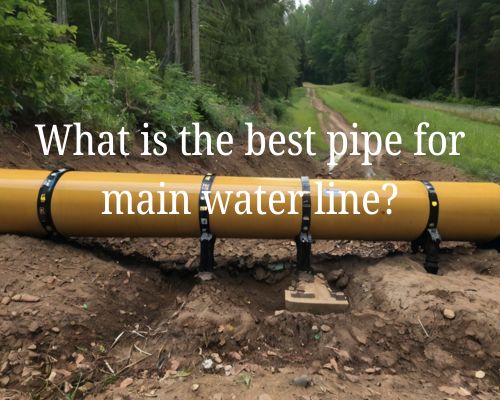“Choosing the right pipe for your main water line is critical for ensuring a reliable and long-lasting water supply to your property. With options ranging from copper to PVC and even PEX tubing, each material comes with its own set of benefits and considerations.” said Dean Owens of Plumber Warragul.
For main water lines, copper pipes stand out due to their corrosion resistance and long lifespan.
You might find yourself weighing the advantages of durability, ease of installation, and cost when deciding which pipe to use.

While PVC offers an affordable option with a respectable pressure rating, soft copper pipes are often recommended for shorter distances for their flexibility and minimal need for underground fittings.
Whether you’re planning a complete plumbing overhaul or simply facing the need to replace your ageing water line, understanding the strengths and limitations of each pipe type will give you confidence in your choice.
It’s not just about getting water from one point to another; it’s about ensuring the safety and efficiency of your home’s water supply system.
Evaluating Pipe Materials for Water Supply Lines
When choosing the best pipe materials for water supply lines, consider factors such as material composition, longevity, and resistance to corrosion.
It’s crucial to balance cost against performance and durability to make an informed decision.
Metal vs Plastic Pipes
When deciding between metal and plastic pipes for water mains, it’s vital to weigh the benefits of each.
Metal pipes, like copper and galvanised steel, offer excellent longevity and strength. Copper is a favourite for its durability and suitability for potable water, while galvanised steel provides robust options where high-pressure resistance is needed.
On the other hand, plastic pipes such as PVC and PEX are preferred for their flexibility and ease of installation.
PVC is a cost-effective choice with chemical resistance properties, and PEX is appreciated for its ability to adapt to various installation methods, particularly in retrofitting situations.
Corrosion Resistance and Longevity
Corrosion resistance is a key property that influences the lifespan of piping materials.
Copper pipes are well-regarded for their resistance to corrosion, making them an excellent choice for longevity. However, in specific scenarios, they may react with particular water compositions, potentially leading to corrosion over time.
Meanwhile, plastic pipes like PVC and PEX offer notable resistance to chemical reactions that typically lead to metal corrosion. This makes them suitable for environments with complex water chemistries. Ductile iron pipes are another option with enhanced resistance capabilities due to a protective lining.
Key Properties of Piping Materials
Each type of piping material possesses distinct properties relevant to its function and performance in water supply systems.
Copper pipes stand out for their thermal resistance and durability, making them apt for a range of temperatures.
PVC pipes excel due to their strong resistance to chemical erosion and affordability, ideal for budget-conscious projects.
PEX pipes offer flexibility that supports diverse plumbing arrangements and installation scenarios. Meanwhile, ductile iron pipes bring added strength to the system, particularly beneficial in high-pressure conditions.
Choosing the right material depends on environmental conditions, budget, and intended use within the plumbing system.
Practical Considerations for Water Main Installation
When installing water mains, consider factors such as ensuring the correct sizing and compatibility of pipes and securing proper installation and maintenance. These elements significantly impact the efficiency and longevity of water service systems. Let us have an understanding on these with Dean Owens of Plumber Warragul.
Sizing and Compatibility
Proper sizing is crucial in water main installations to ensure adequate water pressure and prevent issues like water hammer.
Pipe diameter must be selected based on water distribution needs and local codes. Larger diameters typically handle higher pressures better, enhancing water supply reliability.
Plastic pipes like PVC offer benefits such as corrosion resistance and ease of handling.
It’s important to ensure compatibility with existing plumbing pipe materials to avoid connectivity issues. Consult with professional plumbers or contractors to verify that your chosen materials meet required specifications and accommodate future extensions or modifications.
Installation and Maintenance
Proper installation is key to ensuring long-term functionality.
Accredited developers or contractors should handle water service installations. This ensures proper handling of the installation process.
Water mains should ideally have minimal jointing. This allows connections at a 90-degree angle from the main line to ensure stability and ease of access.
Regular maintenance is vital. Routine checks help identify potential problems before they escalate. This preserves functionality and reduces the risk of costly repairs.
Familiarise yourself with the local code requirements for water main installation and maintenance. This ensures compliance and optimal performance of your water supply lines.